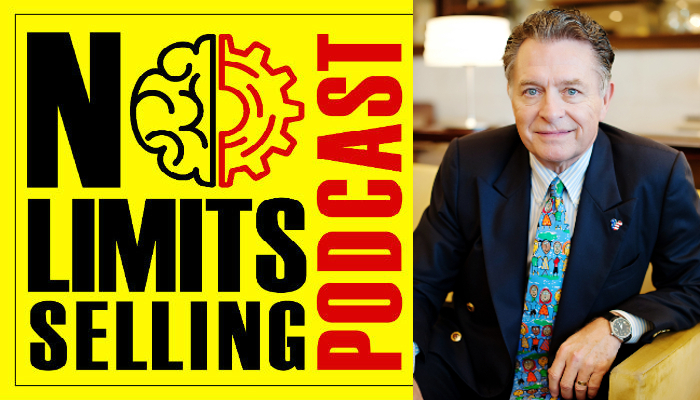The Importance of Trust in Leadership by Lee Cockerell
On Episode 120 of The No Limits Selling Podcast, we have Lee Cockerell, Disney Retired & Founder of Cockerell Academy. Lee Cockerell retired as the Executive Vice President of Operations for the WALT DISNEY WORLD® Resort in Lake Buena Vista, Florida, a position he held for ten years. His responsibilities encompassed a diverse mix of operations, which included 20 resort hotels with over 24,000 Guest rooms, 4 theme parks, 2 water parks, 5 golf courses, a shopping village & nighttime entertainment complex, the ESPN Sports Complex, and the ancillary operations support functions.
Lee joined the Disney organization in July 1990 as Director of Food and Beverage and Quality Assurance for the Disneyland Paris hotels. Before joining the Walt Disney World Co., he spent seventeen years in various executive positions with the Marriott Corporation and eight years with Hilton Hotels.
Lee is the best-selling author of four books on leadership, management, and world class customer service;
Creating Magic…10 Common Sense Leadership Strategies from a Life at Disney is now available in 21 languages.
The Customer Rules...The 39 Essential Rules for Delivering Sensational Service is currently available in 15 languages.
Time Management Magic…How to Get More Done Every Day
Career Magic…How to Stay on Track to Achieve a Stellar Career
Lee and his wife Priscilla reside in Orlando, Florida. Lee enjoys teaching leadership, management, and service excellence seminars, traveling, dining out, and most of all spending time with his three grandchildren, Jullian, Margot, and Tristan.

Contact Lee:
[EDITOR’S NOTE: This podcast is sponsored by No Limits Selling. It is a fun, fast-paced podcast that delivers hard-fought business advice that you can implement today to improve your sales and performance]
Interested In Our Real Estate Coaching Services? Explore Our Website: Link
Feeling Not Well Today? You Can Use Our Mindset Boosters App To amp Up Your Mood: Link
Find us on Social Media:
LinkedIn | Facebook community | Instagram
Like what do you listen to? Subscribe to our podcast!
Ready to become fearless? We can help you become fearless in 60 days so you accomplish more in your career Schedule A 15 min Call with Umar
Summary
Introduction and Guest Background
The podcast episode features Lee Cockerell, the former VP of Operations at Walt Disney Resorts, as a guest. The host, Umar Hameed, introduces Cockerell and highlights his significant role at Disney, managing thousands of employees and maintaining high-quality operations.
Cockerell's Career Journey
Cockerell shares his career journey, which began in the hospitality industry after his stint in the army. He started as a waiter at the Washington Hilton and worked for Hilton for eight years in various locations, including Chicago, New York, and Los Angeles. He then joined Marriott, where he spent 17 years and rose to the position of Vice President of Food and Beverage. In 1990, Disney recruited him to open Disneyland Paris. After three years in France, he returned to Orlando to oversee operations for another decade.
Military Experience and Its Impact
Cockerell's time in the army played a significant role in shaping his professional life. He served as a cook in the military, which later influenced his focus on the food business. The army taught him discipline, the importance of following orders, and doing things the right way. He also learned about his capabilities and resilience during his military training.
The Importance of Process
The conversation emphasizes the importance of processes in both the army and businesses. Cockerell and Hameed agree that having a process in place leads to consistency and the possibility of improvement. They discuss how without a process, things can become chaotic, using the example of vaccine distribution at the time of the podcast. They also address the misconception that processes stifle creativity, arguing that processes are essential for achieving excellence in any field.
Conclusion
In this episode of the No Limits Selling Podcast, host Umar Hameed interviews Lee Cockerell, the former VP of Operations at Walt Disney Resorts. Cockerell shares his career trajectory, starting as a waiter after his military service, progressing through the ranks at Hilton and Marriott, and eventually leading operations at Disneyland Paris and Walt Disney Resorts in Orlando. His military experience, particularly the discipline, and resilience he gained, played a crucial role in his professional development.
A key theme of the conversation is the importance of process in achieving consistency and excellence, whether in the military or business. Despite common misconceptions, Cockerell and Hameed argue that processes do not stifle creativity but rather provide a framework for continuous improvement, as exemplified in Cockerell's successful career in the hospitality industry.
Questions & Answers
Who is Lee Cockerell and what is his background?
What did Lee Cockerell do in the army and how did it influence his career?
What was Lee Cockerell's role at Disney?
What is the importance of process in business according to Lee Cockerell?
How does Lee Cockerell's career journey inspire leaders in the hospitality industry?
What are the key takeaways from Lee Cockerell's interview on the No Limits Selling Podcast?
Don’t miss this opportunity to transform your real estate career with one-on-one coaching. As an experienced real estate coach, I, Umar Hameed, am dedicated to helping you unlock your full potential and achieve your real estate goals. To learn more about who am I and my clients ↓
If you’re ready to take the next step, book an appointment with me today and begin your journey toward success in the real estate industry.
